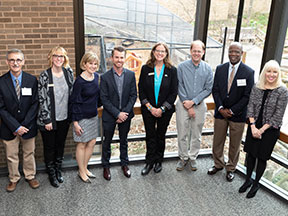CWRU, Holden Arboretum, Cleveland Metroparks Zoo and Cleveland Museum of Natural History join forces to expand research, education opportunities
A team of world-class science researchers and educators at Case Western Reserve University, the Cleveland Metroparks Zoo, the Cleveland Museum of Natural History (CMNH) and the Holden Arboretum are joining together to broaden collaborative research and teaching opportunities in Northeast Ohio.

Each scientific and research institution has signed an affiliation agreement with Case Western Reserve’s Department of Biology, which will serve as the academic degree-granting institution for the group. Representatives from each met at the museum Tuesday evening to ceremonially sign the agreements and celebrate their collaboration.
The agreements make official a variety of existing-but-informal arrangements among the four biology-focused institutions, said Mark Willis, chair of biology at Case Western Reserve. Currently, student researchers work at the museum, zoo and arboretum, while representatives from those organizations sometimes teach at Case Western Reserve or even host courses at their home institution.
“We think this is fantastic for everyone involved and for the region,” Willis said. “One of our goals is for Northeast Ohio to understand how we’re all connected through science. We have a great national, even international reputation, but I think that sometimes is missed right here in Cleveland.”
Sonia Winner, CMNH president and CEO, agreed: “Great things can happen when legacy institutions partner with each other to serve a coming good,” she said. “Attracting talent and collaborating across multiple institutions will enhance the vitality of this region.”
Under new five-year agreements—three individual pacts between the university and each institution—details of the partnerships, including financial terms, have been written into a contract for the first time.
“We are very excited for the opportunities this provides for educating students in plant ecology and environmental science,” said David Burke, chief program officer at the arboretum.
“I can’t think of a better way to highlight our service to the community than through the training of students in critical areas of natural science, while also furthering research to solve so many of today’s environmental and ecological problems.
Collaboration and cooperation
Willis said the contracts came together after about three years of planning among the four institutions.
The catalyst for those early planning sessions was an impromptu collaboration between Willis and Kristen Lukas, the zoo’s director of conservation and science.
“I invited her to give a lecture in my animal-behavior class and she was awesome, of course,” he said. “Then, she told me how she needed some graduate students for some of her research into gorilla health, and it just took off.”
One of those students was Elena Less, now also an associate animal curator at the zoo and featured, along with Lukas, in a 2018 article in The Atlantic about heart disease and improved health care and diet for captive gorillas—the research that lead to her doctorate in biology from CWRU.
“We are thrilled to formalize what has been a very fruitful and engaging partnership,” Lukas said. “We are poised to launch our fifth PhD graduate this spring, continuing a legacy of producing highly trained zoo biologists into our profession. This is a highly competitive and rather unique graduate program.”
CWRU doctoral students are now working on zoo projects in animal behavior, endocrinology, and epidemiology, Lukas said. Those students then undergraduates at the zoo and in Rwanda, via a partnership with the Dian Fossey Gorilla Fund, Lukas said.
Another joint project, led by Gavin Svenson—CMNH director of Research & Collections, curator and head of Invertebrate Zoology and CWRU assistant biology professor—and fellow biology Professor Roy Ritzmann, aims to understand how praying mantises control their behavior. Svenson is a global authority on the evolution of mantises, and Ritzmann is an expert on the insect brain.
“This agreement charts a standing institutional relationship that enhances the world-class biological research coming out of this region,” Svenson said. “Ultimately, this agreement advances the training and experiences of students that work across both institutions in their coursework, independent research, and graduate training.”
The results of their National Science Foundation-funded project are featured in CMNH outreach publications and K-12 teaching materials.
Details and future plans
Although each university-institution agreement varies slightly, in general terms:
- Experts from the museum, zoo and arboretum will be offered non-tenure track faculty teaching and advising positions at the university and have access to its research facilities and resources. Each of those institutions will still pay all wages and benefits of the employees.
- Graduate students working on research funded by grants awarded to the institutions will be eligible for tuition waivers, and the institution and university will each contribute half of their wages.
- CWRU faculty will be offered affiliate appointments to the institutions, allowing access to services such as the libraries, natural areas and research facilities. The university will pay all faculty wages and benefits.
The agreements between CWRU and the museum and arboretum took effect July 1, 2018, while the pact with the zoo, the only public entity among the partners, took effect Oct. 9.
Willis said another long-term goal would be to create a competitive graduate training program—possibly through an endowment—one that would “attract the best graduate students from all over the world who would want to come here for this kind of collaborative opportunity.”
For more information, contact Mike Scott at mike.scott@case.edu.


